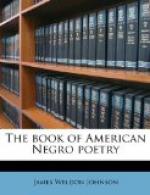Placido is in some respects the greatest of all the Cuban poets. In sheer genius and the fire of inspiration he surpasses even the more finished Heredia. Then, too, his birth, his life and his death ideally contained the tragic elements that go into the making of a halo about a poet’s head. Placido was born in Habana in 1809. The first months of his life were passed in a foundling asylum; indeed, his real name, Gabriel de la Concepcion Valdes, was in honor of its founder. His father took him out of the asylum, but shortly afterwards went to Mexico and died there. His early life was a struggle against poverty; his youth and manhood was a struggle for Cuban independence. His death placed him in the list of Cuban martyrs. On the 27th of June, 1844, he was lined up against a wall with ten others and shot by order of the Spanish authorities on a charge of conspiracy. In his short but eventful life he turned out work which bulks more than six hundred pages. During the few hours preceding his execution he wrote three of his best known poems, among them his famous sonnet, “Mother, Farewell!”
Placido’s sonnet to his mother has been translated into every important language; William Cullen Bryant did it in English; but in spite of its wide popularity, it is, perhaps, outside of Cuba the least understood of all Placido’s poems. It is curious to note how Bryant’s translation totally misses the intimate sense of the delicate subtility of the poem. The American poet makes it a tender and loving farewell of a son who is about to die to a heart-broken mother; but that is not the kind of a farewell that Placido intended to write or did write.
The key to the poem is in the first word, and the first word is the Spanish conjunction Si (if). The central idea, then, of the sonnet is, “If the sad fate which now overwhelms me should bring a pang to your heart, do not weep, for I die a glorious death and sound the last note of my lyre to you.” Bryant either failed to understand or ignored the opening word, “If,” because he was not familiar with the poet’s history.
While Placido’s father was a Negro, his mother was a Spanish white woman, a dancer in one of the Habana theatres. At his birth she abandoned him to a foundling asylum, and perhaps never saw him again, although it is known that she outlived her son. When the poet came down to his last hours he remembered that somewhere there lived a woman who was his mother; that although she had heartlessly abandoned him; that




